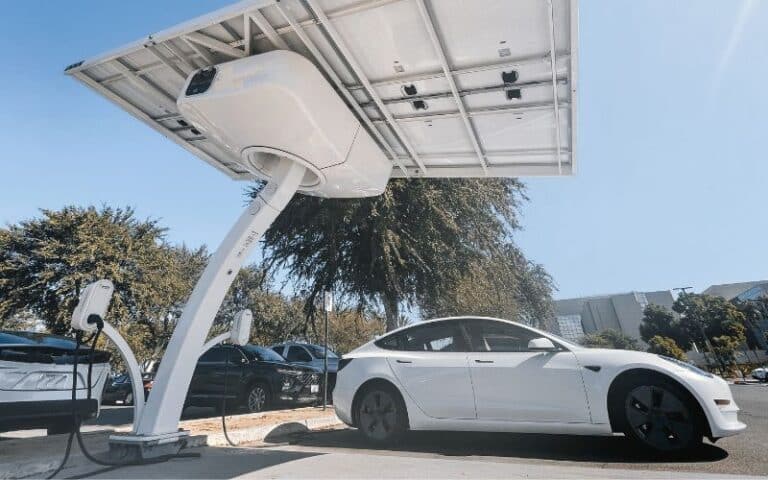8KW Tesla Charging (Things You Must Know)
One question electric car enthusiasts ask when purchasing any model of Tesla is how long it takes to charge.
Fortunately, Tesla has one of the best stations with superchargers that can charge your vehicle in less than an hour.
8kw charger is a destination charger at level 2 and not a supercharger. Recharging a Tesla vehicle using 8kw charging takes a longer charging time. It will take 8 hours to add 200 miles of driving range energy. It will even get slow if you share the station with many individuals.
How fast does 8KW charge a Tesla?

An 8kw charger will take approximately 7-11 hours to charge a Tesla vehicle.
Compared to level 1 chargers, an 8kw charger (level 2) will charge a Tesla vehicle adding roughly 28-30 miles of range per hour. 8 hours of charging will add up to 200 mph.
Most chargers below 50kw are the older model of public charger or destination chargers that uses AC voltage (Alternating Current-voltage).
They are the slowest generation of EV chargers.
A level 1 charger can pull a minimum of 120v (compared to 240v of a level 2) into a vehicle and takes days to charge the vehicle fully.
Chargers that fall between 50kw to 120kw charge faster than an 8kw charger.
These chargers are the improved level 2 chargers found in most charging stations. The battery will take an hour or more before it becomes full.
The fastest is the supercharger, which can charge at 120kw and above.
And it charges in DC voltage (Direct Current) compared to the level 1 and 2 chargers that are all AC voltage.
With this charger, you can get 200 miles of driving range in just 15 minutes.
Fast charging depends on the Tesla model you are using. Newer Tesla models like models 3, S, and X have faster-charging rates than older models.
Model Y has the fastest charging rate, which is up to 250kw.
Although superchargers charge faster than level 1 and 2 chargers, it’s advisable not to use them to charge your vehicle all the time if you want longer battery life.
It’s advisable to use Level 2 as it keeps battery efficiency intact.
Why Is It Charging at Only 8KW?
Kilowatt supply depends on the amount of current given to a charger.
The reason why a charger will charge at only 8kw is because of the amount of current supplied to the charger.
The current supply that makes this happen should fall between 30-32amp.
Except if you are using a supercharger with a DC and a very high volt, charging will fluctuate from time to time.
A level 2 charger operates at 208-240v and charges at a current below 48 amp.
Level 2 charges charge at fluctuating currents of 20 to 48 amp, providing fluctuating watts of 3 -12 kW.
It is most likely you are using a Tesla wall connector. A Tesla wall connector is capable of adapting to most home electrical systems.
Its versatility allows for a connection to the garage and tape current from your home’s electricity.
At a Tesla Charging Station, Which Supercharger Charges at 8 kW?
A supercharger charges up to 120-250 kW. Therefore, 8 kW charging is not a supercharger but a level 2 charger.
If you want to charge at 8kw, use a destination charger.
If you want to save and prolong your vehicle battery life, go to a Tesla destination charging station, not a Tesla supercharging station.
Or you can make use of chargers with outputs below 240v.
Tesla Charging Chart
Electric vehicles require a suitable amount of power output to enable charging.
Charging rates depend on many factors like the charger used, the Battery state, the temperature, and how.
Many cars are using the charging station at the same time as you are. Charging rates vary from older to newer vehicle models.
Below is a table illustration of some examples and their charging rates.
| Car model and battery capacity | Max charging rates |
|---|---|
| Model S/X: 40-75 kWh | Up to 105 kW |
| Model S/X: 85-90 kWh | Up to 120 kW |
| Model S/X: 100 kWh | Up to 145 kW |
| Model S/X(2019): 100 kWh | Up to 200 kW |
| Model S/X (2020 and beyond): 100 kWh | Up to 250 kW |
| Model 3 standard/ standard plus | Up to 170 kW |
| Model 3 medium orange | Up to 200 kW |
| Model 3 Long-range | Up to 250 kW |
| Model Y Long range | Up to 250 kW |
Table 1: Examples of Tesla model and their charging rates (autopilotreview.com)
Tesla’s home charging time depends on the amount of ampere the charger gets from the power source.
Tesla home charging typically uses 20 amp or higher. Below is a table showing home charging charts.
| Circuit | kW | Range per hour |
|---|---|---|
| 60 kW | 11-12 | 30 -44 miles (model X to model S) |
| 40 kW | 7-8 | 20-30 miles |
| 20 kW | 3.8 | 8-15 miles |
Table 2: home charging chart based on the circuit. (Autopilotreview.com)
How Long Does it Take to Charge at an 8kW Supercharger?
How fast it takes to charge a Tesla vehicle is generally based on the type of model you are charging, the battery capacity, the charging wattage, and the charging percentage.
However, charging a Tesla vehicle with an 8kw supercharger from no charge ( 10% )to full (90%) will take hours.
To know how fast to charge your Tesla model, you need to know three important things;
#1. Battery Capacity
The total energy a battery can generate is called its battery capacity.
Tesla is known to produce vehicle models with a battery capacity ranging from 50-100 kWh.
#2. Charging Wattage
Charging wattage is the number of watts a charger can use while charging.
Tesla superchargers have a wattage of 150-250 kWh. Public chargers (destination chargers) produce Watts of 11-22 kWh.
In contrast, a home Tesla wall connector produces 1.8-11.5 kWh wattage.
#3. Charging Percentage
Time taken to charge a Tesla vehicle depends on the percentage it is when it starts charging.
The Tesla company advises users to charge their battery to 90% and never 10%.
And never allow the battery to go below 10% before charging. Therefore we are talking about charging from 10% to 90%.
Let’s say the Tesla model you are using has a battery capacity of 60 kWh. It needs 8 kW charging wattage.
Using a Tesla calculator where charging time is = battery capacity/charging wattage = 60 kWh/8kwh = 7.5.
Therefore it takes 7 hours 30 minutes to charge a Tesla model with a battery capacity of 60 kWh from 10% to 90%.
Mileage depends on certain conditions like driving conditions, temperature, rate of acceleration, etc.
But it mostly depends on the battery capacity, not the Tesla model you are using, and not the charging wattage.
Conclusion
Tesla has one of the best-charging stations that allows easy access to superchargers and destination chargers, even providing charge-at-home chargers to aid user convenience.
The latest Tesla model has improved charging times. The good news is you get to use the charger that seems convenient for yourself and your battery.






